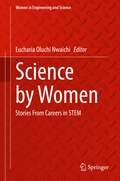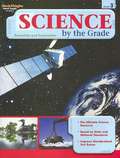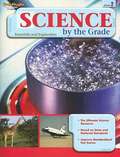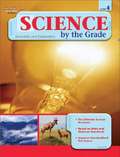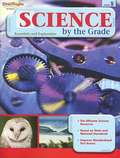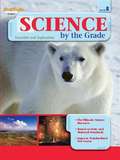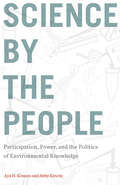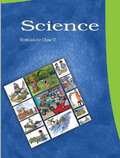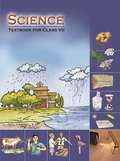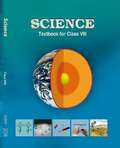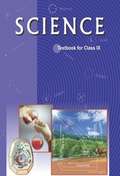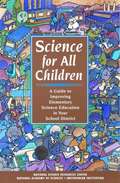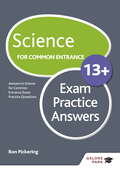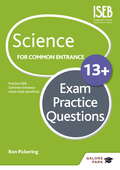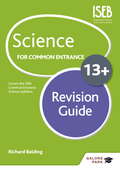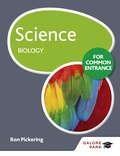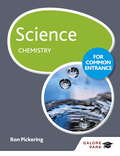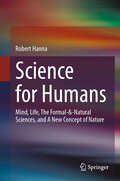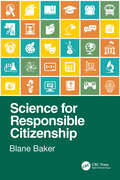- Table View
- List View
Science by Women: Stories From Careers in STEM (Women in Engineering and Science)
by Eucharia Oluchi NwaichiThis book provides a roadmap for those embarking on a career in STEM, whether in the research or industry realms. Focusing on paths taken by women, the contributors lend their stories, tips and tricks, and hardships they faced entering into fields historically dominated by men. The authors provide practical advice, highlighting soft skills that are not often taught as modules in the classroom. Topics include research collaborations, performance enhancement, the gender lens in research design and development, imposter syndrome felt by many women in science, ethics in science, scaling feminine leadership, being an influencer as a science leader, and time and resources optimization for career advancement in science from resource-poor settings. Others interested in science and its impacts on society will also find the book informative and timely. As an important part of the Organization for Women in Science in the Developing World (OWSD), University of Port Harcourt Branch Book project, the work hopes to inspire women and men, girls and boys to enter and apply themselves to secure the future in STEM.
Science by the Grade Essentials and Exploration: Grade 3
by Harcourt AchieveScience textbook for Grade 3
Science by the Grade: Essentials and Exploration, Grade 2
by Steck-VaughnThe contents of this book are based upon the National Science Education Standards for Grade 2. These standards include (A) Science as Inquiry, (B) Physical Science, (C) Life Science, (D) Earth and Space Science, (E) Science and Technology, (F) Science in Personal and Social Perspectives, and (G) History and Nature of Science. This book will help teachers, students, parents, and tutors. Teachers can use this book either to introduce or review a topic in their science classroom. Students will find the book useful in reviewing the major concepts in science. Parents can use this book to help their children with topics that may be posing a problem in the classroom. Tutors can use this book as a basis for their lessons and for assigning questions and activities. This book includes ten lessons that focus on the ten major concepts presented in the content standards: Physical Science, Life Science, and Earth and Space Science. The lessons also cover the twelve major concepts presented in the other standards. A table on page 4 provides a correlation between the contents of each lesson and the National Science Education Standards.
Science by the Grade: Essentials and Exploration, Grade 4
by Steck-VaughnThe contents of this book are based upon the National Science Education Standards for Grade 4. These standards include (A) Science as Inquiry, (B) Physical Science, (C) Life Science, (D) Earth and Space Science, (E) Science and Technology, (F) Science in Personal and Social Perspectives, and (G) History and Nature of Science. This book will help teachers, students, parents, and tutors. Teachers can use this book either to introduce or review a topic in their science classroom. Students will find the book useful in reviewing the major concepts in science. Parents can use this book to help their children with topics that may be posing a problem in the classroom. Tutors can use this book as a basis for their lessons and for assigning questions and activities. This book includes ten lessons that focus on the ten major concepts presented in the content standards: Physical Science, Life Science, and Earth and Space Science. The lessons also cover the twelve major concepts presented in the other standards. A table on page 4 provides a correlation between the contents of each lesson and the National Science Education Standards.
Science by the Grade: Essentials and Exploration, Grade 5
by Steck-VaughnThe contents of this book are based upon the National Science Education Standards for Grade 5. These standards include (A) Science as Inquiry, (B) Physical Science, (C) Life Science, (D) Earth and Space Science, (E) Science and Technology, (F) Science in Personal and Social Perspectives, and (G) History and Nature of Science. This book will help teachers, students, parents, and tutors. Teachers can use this book either to introduce or review a topic in their science classroom. Students will find the book useful in reviewing the major concepts in science. Parents can use this book to help their children with topics that may be posing a problem in the classroom. Tutors can use this book as a basis for their lessons and for assigning questions and activities. This book includes ten lessons that focus on the ten major concepts presented in the content standards: Physical Science, Life Science, and Earth and Space Science. The lessons also cover the twelve major concepts presented in the other standards. A table on page 4 provides a correlation between the contents of each lesson and the National Science Education Standards.
Science by the Grade: Essentials and Exploration, Grade 8
by Steck-VaughnThe contents of this book are based upon the National Science Education Standards for Grade 8. These standards include (A) Science as Inquiry, (B) Physical Science, (C) Life Science, (D) Earth and Space Science, (E) Science and Technology, (F) Science in Personal and Social Perspectives, and (G) History and Nature of Science. This book will help teachers, students, parents, and tutors. Teachers can use this book either to introduce or review a topic in their science classroom. Students will find the book useful in reviewing the major concepts in science. Parents can use this book to help their children with topics that may be posing a problem in the classroom. Tutors can use this book as a basis for their lessons and for assigning questions and activities. This book includes ten lessons that focus on the ten major concepts presented in the content standards: Physical Science, Life Science, and Earth and Space Science. The lessons also cover the twelve major concepts presented in the other standards. A table on page 4 provides a correlation between the contents of each lesson and the National Science Education Standards.
Science by the People: Participation, Power, and the Politics of Environmental Knowledge (Nature, Society, and Culture)
by Aya H. Kimura Abby KinchyCitizen science—research involving nonprofessionals in the research process—has attracted both strong enthusiasts and detractors. Many environmental professionals, activists, and scholars consider citizen science part of their toolkit for addressing environmental challenges. Critics, however, contend that it represents a corporate takeover of scientific priorities. In this timely book, two sociologists move beyond this binary debate by analyzing the tensions and dilemmas that citizen science projects commonly face. Key lessons are drawn from case studies where citizen scientists have investigated the impact of shale oil and gas, nuclear power, and genetically engineered crops. These studies show that diverse citizen science projects face shared dilemmas relating to austerity pressures, presumed boundaries between science and activism, and difficulties moving between scales of environmental problems. By unpacking the politics of citizen science, this book aims to help people negotiate a complex political landscape and choose paths moving toward social change and environmental sustainability.
Science class 10 - Meghalaya Board
by Meghalaya Board of School EducationPublished by the Meghalaya Boad of School Education for Class X, this is a textbook in science and is made according to the latest syllabus pattern set by the CBSE board. It contains topics from the standard syllabus such as chemical reactions and equations, metals and non-metals, acids, bases, and salts, carbon, the periodic table, life processes, reproduction, heredity, light, electricity, the human eye, energy, magnetism, the environment, and resource management. In order to make learning easier, the books are furnished with illustrations that convey clear-cut ideas to students. Similarly, the examples provided in the book are well described and help in clearing any confusions that may arise. The book also comes with solved and unsolved questions so that students can test themselves, and improve their skills.
Science class 10 - NCERT - 23
by National Council of Educational Research and TrainingThe "Science Textbook for Class X" by NCERT provides a comprehensive overview of essential scientific concepts catered to the tenth-grade level in the Indian education system. The textbook is meticulously structured, covering diverse areas of science, including physics, chemistry, and biology. Students are introduced to concepts like electricity, magnetic effects of electric current, and sources of energy in physics. In chemistry, the book delves into topics such as chemical reactions, acids, bases, metals, and non-metals. The biology section explores the intricate facets of life processes, reproduction, heredity, and evolution. Alongside theoretical content, the book incorporates practical applications, real-world examples, and experimental procedures, fostering an experimental and inquiry-based learning approach. Diagrams, illustrations, and exercises further enhance understanding and retention. By the end of this textbook, students gain a robust foundation in core scientific principles, preparing them for advanced studies and real-world scientific applications.
Science class 6 - NCERT - 23
by National Council of Educational Research and TrainingThe Class VI Science textbook published by NCERT (National Council of Educational Research and Training) is a comprehensive guide designed to introduce young learners to the fundamentals of science. The book is structured in a manner that fosters an understanding of basic scientific principles through engaging text and vivid illustrations. It covers various topics such as food, components of food, fibers, sorting materials into groups, living organisms and their surroundings, body movements, light, shadows and reflection, electricity and circuits, fun with magnets, water, air, garbage in, garbage out, among others. Each chapter is meticulously curated to encourage interactive learning, with thought-provoking exercises, activities, and experiments that enable students to apply their knowledge practically. The textbook aims to kindle curiosity and critical thinking, fostering a scientific temper among students while promoting an appreciation for the world around them. It aligns with the NCERT curriculum, providing a solid foundation in science and encouraging students to explore the subject with enthusiasm and inquisitiveness.
Science class 7 - NCERT - 23
by National Council of Educational Research and Training"Science Class 7 by NCERT offers an enchanting voyage into the wonders of the natural world. Delving into the secrets of plant nutrition, animal digestion, and the nuances of heat transfer, the curriculum sparks curiosity. Chemistry comes alive as students explore the realms of acids, bases, and salts, witnessing captivating transformations during physical and chemical changes. The intricate networks that transport nutrients within organisms are unveiled, along with the fascinating mechanisms of plant reproduction. Chapters on motion, time, electricity, and light weave a tapestry of scientific marvels, engaging learners with activities and experiments. The importance of forests in our lives is emphasized, underscoring their crucial role in sustaining our planet. Concluding with a focus on wastewater, students discover the significance of responsible treatment for a healthier Earth. With vibrant illustrations and hands-on experiences, Science Class 7 by NCERT promises a mind-blowing exploration, inviting students to marvel at the astonishing intricacies of the world around them."
Science class 8 - NCERT - 23
by National Council of Educational Research and TrainingThe NCERT Class 8 Science textbook provides a comprehensive overview of key scientific concepts and principles designed to engage and educate students at the middle school level. Divided into several chapters covering topics such as Crop Production and Management, Microorganisms, Synthetic Fibers and Plastics, and Conservation of Plants and Animals, the textbook delves into fundamental scientific principles with clarity and depth. Through a combination of informative text, colorful illustrations, and hands-on activities, students are encouraged to develop a deeper understanding of various scientific phenomena and their real-world applications. Additionally, the textbook emphasizes critical thinking and problem-solving skills, fostering a holistic approach to scientific inquiry and exploration. With its structured curriculum and accessible language, the NCERT Class 8 Science textbook serves as an invaluable resource for students seeking to develop a strong foundation in science.
Science class 8 - Tamil Nadu Board
by State Council of Educational Research and TrainingThe textbook underscores the critical role of measurement in scientific inquiry and everyday life, introducing various unit systems such as FPS, CGS, and MKS, while emphasizing the International System of Units (SI). It elaborates on the seven base quantities—length, mass, time, temperature, electric current, amount of substance, and luminous intensity—and their respective SI units. The text further explains temperature as a measure of average kinetic energy and electric current as the flow of electric charges, detailing their units and measurement methods. Additionally, it covers derived quantities like plane angle and solid angle, describing their definitions and units. Through activities and practical examples, the textbook aims to deepen students' grasp of fundamental scientific concepts.
Science class 8 - Tamil Nadu Board: அறிவியல் எட்டாம் வகுப்பு
by State Council of Educational Research and Training Tamil Naduதற்போதைய வகுப்பில், அறிவியல் பாடத்தின் அனைத்து முக்கிய தலைப்புகளையும் உள்ளடக்கியதாக புது பயிலும் வழிகாட்டி வகுப்புகள் வழங்கப்பட்டுள்ளன. உடல் மற்றும் பொருளின் அடிப்படை அமைப்புகள், உயிரியல், வேதியியல் மற்றும் இயற்பியல் ஆகிய பிரிவுகளை அடிப்படையாகக் கொண்டு பாடம் முன்னெடுக்கப்படுகிறது. மாணவ/மாணவிகளுக்கான செயல்பாட்டு பரிசோதனைகள், விளக்கங்கள் மற்றும் எளிய விளக்கங்களுடன் கொடுக்கப்பட்டுள்ளன. உயிரின் வளர்ச்சி, சுற்றுச்சூழலுடன் உறவாடல் மற்றும் அறிவியல் நவீன தேசங்களின் முன்னேற்றம் ஆகியவை கற்றுக்கொள்ள முக்கியமான அம்சங்களாக இருக்கின்றன.
Science class 9 - NCERT - 23
by National Council of Educational Research and TrainingThe Class 9 Science textbook by NCERT provides a comprehensive exploration of fundamental scientific concepts. Divided into chapters covering topics like matter, motion, energy, and biology, it offers clear explanations supported by diagrams and examples. Emphasizing critical thinking and practical application, the textbook encourages students to engage in scientific inquiry and experimentation. It includes activities, experiments, and questions to reinforce learning and assess understanding. By fostering a deeper appreciation for science and its principles, the textbook equips students with the knowledge and skills necessary for further studies and real-world applications.
Science class 9 - Tamil Nadu Board
by Government of Tamil NaduThis book is developed in a holistic approach which inculcates comprehending and analytical skills. It will be helpful for the students to understand higher secondary science in a better way and to prepare for competitive exams in future. This textbook is designed in a learner centric way to trigger the thought process of students through activities and to make them excel in learning science.
Science for All Children: A Guide to Improving Elementary Science Education in Your School District
by National Academy of Sciences Staff Smithsonian Institution StaffRemember the first time you planted a seed and watched it sprout? Or explored how a magnet attracted a nail? If these questions bring back memories of joy and wonder, then you understand the idea behind inquiry-based science--an approach to science education that challenges children to ask questions, solve problems, and develop scientific skills as well as gain knowledge. Inquiry-based science is based on research and experience, both of which confirm that children learn science best when they engage in hands-on science activities rather than read from a textbook.The recent National Science Education Standards prepared by the National Research Council call for a revolution in science education. They stress that the science taught must be based on active inquiry and that science should become a core activity in every grade, starting in kindergarten. This easy-to-read and practical book shows how to bring about the changes recommended in the standards. It provides guidelines for planning and implementing an inquiry-based science program in any school district.The book is divided into three parts. "Building a Foundation for Change," presents a rationale for inquiry-based science and describes how teaching through inquiry supports the way children naturally learn. It concludes with basic guidelines for planning a program.School administrators, teachers, and parents will be especially interested in the second part, "The Nuts and Bolts of Change." This section describes the five building blocks of an elementary science program: Community and administrative support. A developmentally appropriate curriculum. Opportunities for professional development. Materials support. Appropriate assessment tools. Together, these five elements provide a working model of how to implement hands-on science.The third part, "Inquiry-Centered Science in Practice," presents profiles of the successful inquiry-based science programs in districts nationwide. These profiles show how the principles of hands-on science can be adapted to different school settings.If you want to improve the way science is taught in the elementary schools in your community, Science for All Children is an indispensable resource.
Science for Children
by Marilyn FleerScience for Children introduces readers to the pedagogy of primary and early childhood science education. The book pays special attention to the three strands of science, in accordance with the Australian Curriculum. <P><P>It also uses the practice principles and learning outcomes of the national Early Years Learning Framework to present content for babies through to the transition into the Foundation year at school. Science for Children explores various approaches to teaching and learning in science. It covers inquiry approaches in detail; makes explicit links to the 5Es; critiques longstanding approaches, such as discovery approaches and a transmission approach; and explores Indigenous perspectives and a Vygotskian framework. This allows the reader to make informed choices about when to use a particular approach in primary classrooms and early childhood settings. Designed to prepare future educators for practice, Science for Children challenges students and offers practical classroom-based strategies for their science teaching careers.
Science for Common Entrance 13+ Exam Practice Answers (for the June 2022 exams)
by Ron PickeringPlease note, this resource is suitable for the exams up to June 2022. New revision resources will be available from Spring 2022 for the exams from November 2022.Exam Board: ISEBLevel: 13+Subject: ScienceFirst Teaching: September 2015First Exam: Autumn 2018Confidently mark answers to the Science for Common Entrance 13+ Exam Practice Questions with worked examples, exam advice and tips for achieving the best results- Helps pupils to refine answers with guidance and worked examples- Includes ISEB Common Entrance mark scheme and advice for achieving top marks- Suitable for all ISEB Science 13+ Common Entrance exams taken from Autumn 2017 onwardsAlso available to purchase from the Galore Park website www.galorepark.co.uk:- Science for Common Entrance 13+ Exam Practice Answers- Science for Common Entrance 13+ Exam Practice Questions- Science for Common Entrance 13+ Revision Guide- Science for Common Entrance: Biology- Science for Common Entrance: Biology Answers- Science for Common Entrance: Chemistry- Science for Common Entrance: Chemistry Answers- Science for Common Entrance: Physics- Science for Common Entrance: Physics Answers
Science for Common Entrance 13+ Exam Practice Questions (for the June 2022 exams)
by Ron PickeringPlease note, this resource is suitable for the exams up to June 2022. New revision resources will be available from Spring 2022 for the exams from November 2022.Exam Board: ISEBLevel: 13+Subject: ScienceFirst Teaching: September 2015First Exam: Autumn 2018Practise 13+ Science with this wealth of exam-style questions that have been designed to reflect the style and level of the ISEB Common Entrance Science exam. The range of questions helps pupils improve their exam technique and provides realistic practice for Biology, Chemistry and Physics exams at 13+.- Covers every 13+ topic for Biology, Chemistry and Physics- Familiarises pupils with the type of questions they will face in the exam- Identifies strengths and weaknesses using topic-based exercises- Suitable for ISEB 13+ Mathematics Common Entrance exams taken from Autumn 2017 onwardsAlso available to purchase from the Galore Park website www.galorepark.co.uk:- Science for Common Entrance 13+ Exam Practice Answers- Science for Common Entrance 13+ Revision Guide- Science for Common Entrance: Biology- Science for Common Entrance: Biology Answers- Science for Common Entrance: Chemistry- Science for Common Entrance: Chemistry Answers- Science for Common Entrance: Physics- Science for Common Entrance: Physics Answers
Science for Common Entrance 13+ Revision Guide (for the June 2022 exams)
by Richard BaldingPlease note, this resource is suitable for the exams up to June 2022. New revision resources will be available from Spring 2022 for the exams from November 2022.Exam Board: ISEBLevel: 13+Subject: ScienceFirst Teaching: September 2015First Exam: Autumn 2017Revise every topic and theory tested in the ISEB 13+ Common Entrance exams for Biology, Chemistry and Physics. This essential revision tool covers all the content of the new ISEB 13+ Common Entrance syllabus for Biology, Chemistry and Physics. The knowledge required for the exam is integrated with practical exam tips and advice to make revision easier and more effective.- Consolidates revision with all key information in one place- Ensures pupils have covered everything with the handy revision checklist- 'Test yourself' exercises identify areas requiring further study- Suitable for ISEB 13+ Science Common Entrance exams taken from Autumn 2017 onwardsAlso available to purchase from the Galore Park website www.galorepark.co.uk:- Science for Common Entrance 13+ Exam Practice Answers- Science for Common Entrance 13+ Exam Practice Questions- Science for Common Entrance: Biology- Science for Common Entrance: Biology Answers- Science for Common Entrance: Chemistry- Science for Common Entrance: Chemistry Answers- Science for Common Entrance: Physics- Science for Common Entrance: Physics Answers
Science for Common Entrance: Biology
by W. R. PickeringCover everything required for the 13+ Common Entrance Biology exam with clearly presented content, lively illustrations and challenging end-of-chapter questions. This challenging and stimulating Science course has been reviewed by the ISEB subject editor and covers the content of both Levels 1 and 2 of the 13+ Biology exam. Designed for pupils in Years 7 and 8, it is an indispensable resource that lays the foundations for Common Entrance success. - Explores every Level 1 and 2 topic with clear explanations and examples - Includes topic-based exercises and extension questions - Builds on previous study with preliminary knowledge sections Also available: - Science for Common Entrance: Biology Answers - Science for Common Entrance: Chemistry - Science for Common Entrance: Chemistry Answers - Science for Common Entrance: Physics - Science for Common Entrance: Physics Answers - Science for Common Entrance 13+ Exam Practice Answers - Science for Common Entrance 13+ Exam Practice Questions - Science for Common Entrance 13+ Revision Guide
Science for Common Entrance: Chemistry
by W. R. PickeringThis challenging and stimulating Science course has been reviewed by the ISEB subject editor and covers the content of both Levels 1 and 2 of the 13+ Chemistry exam. Designed for pupils in Years 7 and 8, it is an indispensable resource that lays the foundations for Common Entrance success. - Explores every Level 1 and 2 topic with clear explanations and examples - Includes topic-based exercises and extension questions - Builds on previous study with preliminary knowledge sections - Suitable for ISEB 13+ Mathematics Common Entrance exams taken from Autumn 2017 onwards Also available to purchase from the Galore Park website www.galorepark.co.uk: - Science for Common Entrance: Chemistry Answers - Science for Common Entrance: Biology - Science for Common Entrance: Biology Answers - Science for Common Entrance: Physics - Science for Common Entrance: Physics Answers - Science for Common Entrance 13+ Exam Practice Answers - Science for Common Entrance 13+ Exam Practice Questions - Science for Common Entrance 13+ Revision Guide
Science for Humans: Mind, Life, The Formal-&-Natural Sciences, and A New Concept of Nature
by Robert HannaThis book presents and defends an original and paradigm-shifting conception of formal science, natural science, and the natural universe alike, that’s fully pro-science, but at the same time neither theological or God-centered, nor solipsistic or self-centered, nor communitarian or social-institution-centered, nor scientistic or science-valorizing, nor materialist/physicalist or reductive, nor—above all—mechanistic. It does this by presenting and defending what Robert Hanna calls the neo-organicist turn, including manifest realism and the three sub-parts of metaphysical organicism: liberal naturalism, mind-life continuity, and explanatory inversion, whereby mechanical systems are explained by grounding them in organic systems, and not the other way around. Or more briefly and simply put, the purpose of this book is to present and defend science for humans. As such, it will be highly interesting and profoundly relevant to graduate students and specialist researchers in philosophy and the formal-&-natural sciences.
Science for Responsible Citizenship
by Blane BakerScience for Responsible Citizenship helps the reader to understand how science works and how science can help us develop reasonable and logical solutions to worldwide problems. Basic science knowledge and possible solutions based on scientific reasoning are explored, with a focus on interdisciplinary topics including disease transmission, energy, and climate change. The book starts with discussing the role of science in modern society, before tackling the basic science of global warming, human health, chemical processes that contribute to life on Earth, and the importance of water. The second half of the book describes the science of the electrical grid, nuclear reactions, devices and reactors, the Earth’s habitability, electronics, and optics, and concludes with a look ahead at the scientific and technological challenges of future energy needs and sustainable energy. This book can be used as part of a general science course at the college level and is also accessible to anyone with a high school background.Key Features: Addresses the fundamentals of scientific knowledge and reasoning in a clear and accessible style Offers a timely exploration of several existential challenges that can be addressed by science Provokes and encourages thought on how to solve some of our global problems
